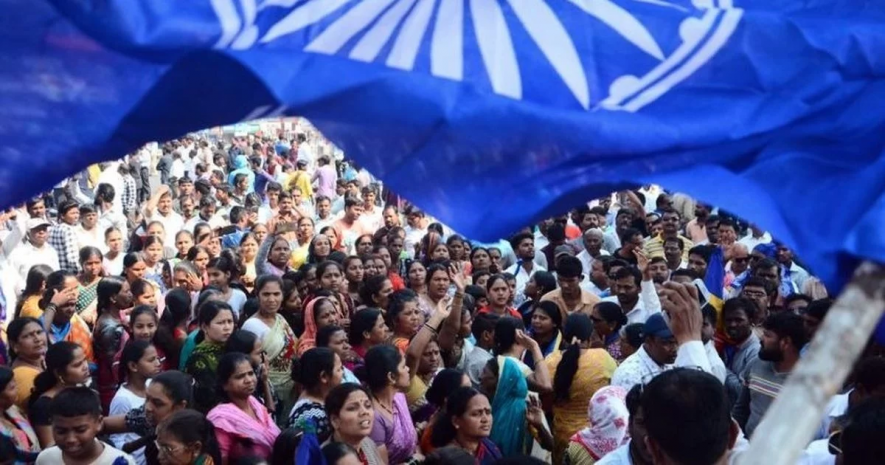Bhim Army Wins Partial Victory from the Bombay HC, Secures Freedom of Movement

Bhim Army Wins Partial Victory from the Bombay HC, Secures Freedom of Movement
In what marks a victory, albeit a partial one for the Bhim Army in Pune, the Bombay High Court today allowed the party’s founder Chandrasekhar Azad and his key supporters to move freely through the state of Maharashtra without any fetters on their movement and public appearances.
Acting on a petition filed by Dutta Pol, Chief of the Bhim Army in Maharashtra, and argued by Advocate Nitin Satpute, a Vacation Bench of Justice CV Bhadang took into account the Mumbai Police’s sworn statement that the detention of Azad and 700 followers of his was an error and an aberration, and allowed the Dalit rights crusader the freedom of movement which is his cherished fundamental right. However, the thorny and burning issue of the freedoms of association and dissent being impinged upon by an intolerant state and its acolytes remains unresolved, as the government has refused the permission to hold a rally in Pune on December 30, and has also allegedly armtwisted the Savitri Bai Phule Pune University to cancel a meeting with students. The issue of denial of permission is to be adjudicated on January 4, well after the key timing of the event – on the occasion of the Bhima Koregaon commemoration – has already passed by.
In his petition, Pol has claimed that the Devendra Fadavis government deliberately cancelled the permission for the Mumbai rally to be held at Jambhori Maidan in Worli, and did not bother to even formally inform him, and that he came to know only through this media report. As for the Pune public meeting, which was to be held in the SSPMS grounds in Pune under the banner of the Bhima Koregaon Sangharsh March on December 31, Pol claims that the police rescinded permission at the eleventh hour, and it was only through a news channel that the organisers came to know of the rescinding.
Claiming a hefty compensation amount from the government for its brazen violation of the key fundamental rights to freedom of association, expression and movement, Pol objected to the clandestine methods adopted by the state to deny permission for public rallies, and without informing the organisers, tipping off certain “loyal” media outlets for broadcasting the information to create disapprobation in the mind of the public.
Mumbai Police Rapped on the Knuckles
During the course of today’s hearing, Justice Bhadang took strong exception to Mumbai Police’s skulduggery of arresting and detaining Azad and his supporters at an opportune moment, and later admitting that its actions were erroneous. He demanded a written undertaking from the cops that the Bhim Army chief and his followers would not be detained henceforth unless they violated public order, and disturbed communal harmony, and the police meekly submitted to this direction. The top brass of the members in Khaki also admitted to, and apologised for, their decision not to formally inform the organisers of the revocation of permission at the last moment.
Public Assembly to Express Dissent- A Fundamental Right
The Mumbai and Pune Police’s denial of permission brings one to the larger question: under what circumstances can the rights to public assembly and expression of dissent be curtailed or impinged upon by the State?
On its part, the Bhim Army had given an assurance that the public meetings in Pune would be addressed by well-known intellectuals such as social activists and political scientists Prajaratna Ambedkar, Amol Meetkari and historian Sarfaraj Sheikh, and that there would be no disruption of public order (as opposed to the narrowly constructed “law and order” situation) and communal harmony. Despite this, permission was denied.
This brings one to social activist Abha Singh’s writ petition filed earlier this month- claiming a reading down of Section 37 of the Bombay Police Act which makes it mandatory for an individual or organisation to secure police permission for a public meeting or gathering comprising more than five persons.
Singh has contended that the provision, which the legislature had intended to be only temporary in nature, has been willy-nilly converted into a permanent diktat by the powers that it, and its application must be pruned in the interest of citizens’ fundamental rights.
That petition is yet to be adjudicated upon, but despite the Bhim Army’s partial victory, the crucial question remains: how to get otherwise institutions not to be coerced or armtwisted by a state which cannot handle any dissent?
Saurav is an independent journalist based out of Delhi, and specialises in reporting on legal, human rights and gender issues. He earlier used to teach media law and jurisprudence in Bombay and Pune. He tweets @SauravDatta29.
Get the latest reports & analysis with people's perspective on Protests, movements & deep analytical videos, discussions of the current affairs in your Telegram app. Subscribe to NewsClick's Telegram channel & get Real-Time updates on stories, as they get published on our website.























